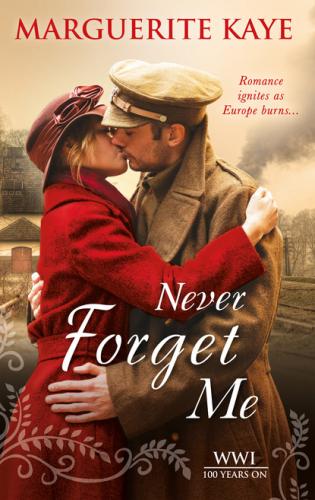This has been by far the most challenging book I've written, but because of that it's also been the most rewarding. I truly hope you find it as rewarding to read.
Table of Contents
Booklist
Author Note
A Kiss Goodbye
Chapter One
Chapter Two
Chapter Three
Chapter Four
Chapter Five
Chapter Six
Chapter Seven
Chapter Eight
Chapter Nine
Dearest Sylvie
Chapter One
Chapter Two
Chapter Three
Chapter Four
Chapter Five
Chapter Six
Chapter Seven
Chapter Eight
Forever With Me
Chapter One
Chapter Two
Chapter Three
Chapter Four
Chapter Five
Chapter Six
Chapter Seven
Chapter Eight
Chapter Nine
Chapter Ten
Historical Note
Marguerite Kaye
Argyll, Scotland—October 1914
Corporal Geraint Cassell, late of the Royal Welsh Fusiliers and currently seconded to the Army Service Corps, gazed out of the window as the staff car swept up the impressive driveway. There was something about the quality of light, the way it filtered through the battleship-grey clouds, casting a soft haze over everything, that made him think of home. The picturesque villages they had skirted on the journey north, though, looked nothing like the gritty Welsh mining village in which he had been raised, where the narrow houses huddled into the valley, their tiny windows looking blindly out onto the road, which rose steeply towards the pit head and the winding wheel that dominated the skyline. In contrast, the whitewashed Highland cottages seemed like something out of a child’s fairy tale.
Private Jamieson pulled the car to a halt in front of Glen Massan House. Geraint surveyed the place with a jaundiced eye. It was more like a castle than a house. Built in the Scots’ baronial style, he had gleaned from the requisition orders, it sat on a promontory with a commanding view over Loch Massan. A large tower five stories high with crenellated battlements bolstered one side of the grey granite building, while the main body of the house, with its steep-pitched roofs and its plethora of smaller, conical towers, seemed to have been added higgledy-piggledy. The result was strangely attractive. It was easy to imagine generations of Carmichael lairds striding out from that massive portico in their plaids, hounds yelping at their heels, to go off on a stag hunt or whatever it was that Scottish lairds did.
Generations of crofters and serfs had no doubt dutifully served their lord and master here, working the land for a pittance and shivering in their thatched cottages, Geraint reminded himself. Whatever this war brought, one thing was certain, it was the end of the line for people like Lord Carmichael and his privileged family.
The war would see the end of the line, too, with a bit of luck, for the ‘Old Contemptibles’ like Colonel Aitchison, whose ilk were bumbling about with General French over on the Western Front. Geraint belatedly turned and saluted as his so-called superior officer finally stumbled out of the staff car juggling gloves, hat and swagger stick. No doubt the Carmichaels of Glen Massan House would resent being evicted from their pretty Highland castle, but Geraint refused to feel sorry for them.
* * *
‘I simply can’t comprehend why the army wants our home. Why Glen Massan?’
The question was rhetorical, though Lady Elizabeth Carmichael had asked it repeatedly since the requisition order had arrived. Her daughter, Flora, looked up from the newspaper in which she had been reading the first encouraging reports of the battle being waged at Ypres. ‘Perhaps it really will be over by Christmas,’ she said, ‘in which case, we will only have to decamp to the Lodge for a few months.’
‘A few months! The place is tiny. There are only three bedrooms.’
‘Then Robbie will have to bunk with Alex the next time he comes up from London,’ Lord Carmichael said patiently.
‘But that means you and I will have to share a bedroom.’
‘We are married, Elizabeth, and there is a war on, in case either fact had escaped your attention. It is up to all of us to make sacrifices.’
Lady Carmichael took a sip of tea. ‘Do you really think it will be over by Christmas as they say?’ she asked her daughter.
Flora’s opinion was so rarely consulted that for a moment she was quite taken aback. ‘I don’t know,’ she answered simply. ‘If the newspapers are to be believed...’ She halted mid-sentence, because the growing casualty lists and the claims of imminent victory seemed to her at odds. The reports in the papers were unrelentingly cheerful, full of praise for the bravery of the men who went ‘over the top’. At times, they made life in the trenches sound like some sort of Boy Scout camp. In the first weeks, Flora had been as enthusiastic as everyone else, but now that men from both sides were dying in unimaginable numbers, she was beginning to have the most unpatriotic doubts about the ability of those in charge to do their job.
Not that she would dream of saying so in front of her parents, who considered any talk of casualties defeatist. Leaning across the table to clasp her mother’s hand, she smiled weakly. ‘Perhaps it will be over soon. I sincerely hope so.’
‘It is selfish of me, but you know how much your brother Alex wishes to join the older boys from his school who have already enlisted.’
‘Alex is only seventeen,’ the laird said pointedly. ‘He is at no risk.’
But Robbie, Flora’s other brother, who was twenty-five and currently running his wine-importing business from London, certainly was. The laird did not say so, but it was obvious to her that all three of them were thinking that Robbie’s joining up was a distinct possibility. ‘It’s
